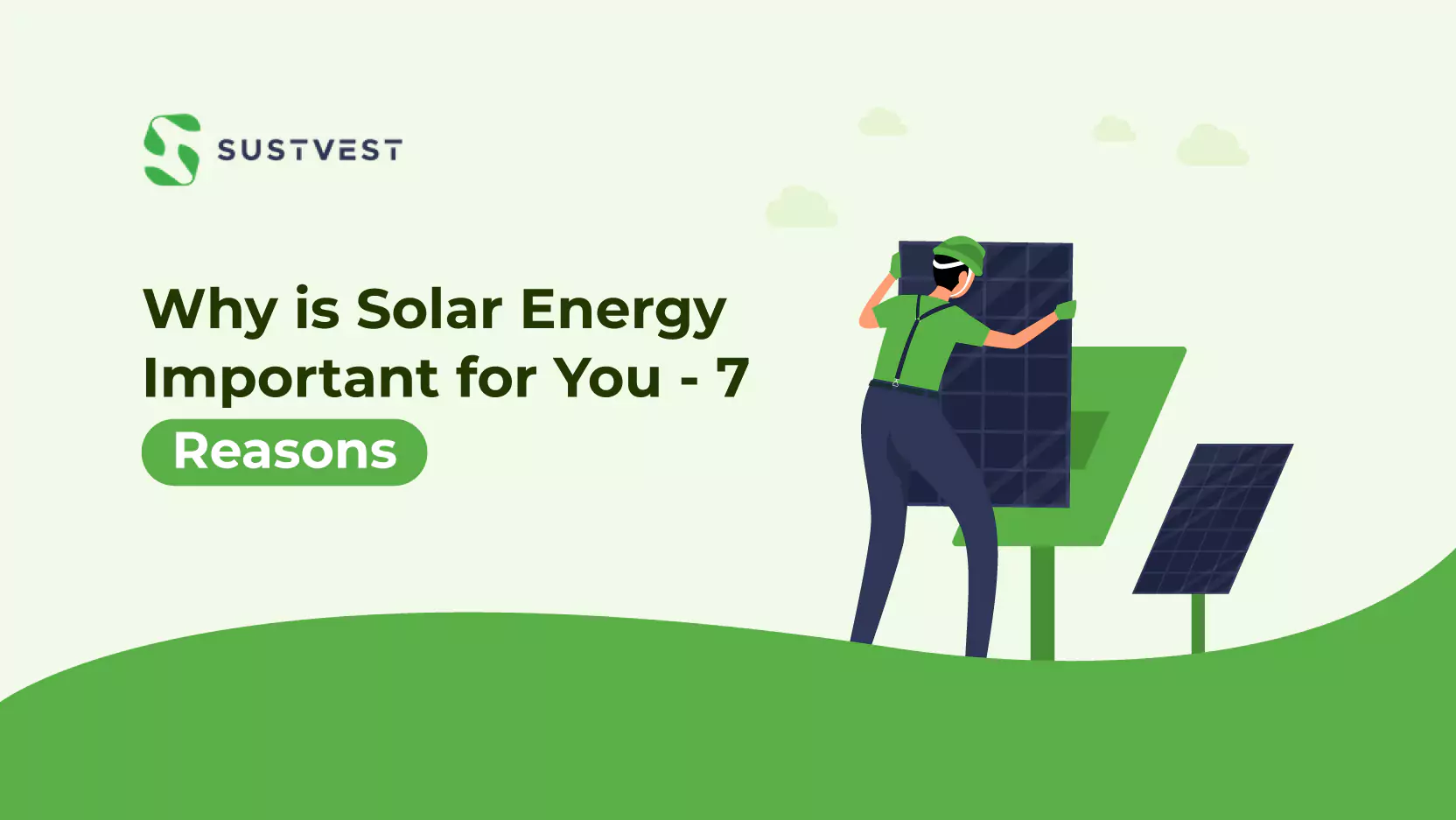Who should pay the price for climate change? The exploding global population and increasing energy consumption have put the future of our planet at stake. Amidst rising CO2 emissions, the importance of solar energy is undeniable.
Why is solar energy important? We will give you a list of 7 reasons and help you dig deep into the solar industry.
Without further ado, let’s begin with understanding the crucial factors behind the importance of solar power.

Importance of Solar Energy – Exploring 7 Key Reasons
1. Environmental Impact: A Cleaner, Greener Tomorrow
Why is solar energy important for the environment? Traditional energy sources, such as fossil fuels, contribute significantly to air and water pollution, as well as greenhouse gas emissions.
On the contrary, solar energy is a clean and green alternative that produces minimal environmental impact. By harnessing the power of the sun, we can reduce our carbon footprint and mitigate the harmful effects of climate change.
2. Renewable Resource: Endless and Sustainable Energy
“Why is it important as a renewable resource?” Unlike finite fossil fuels, solar energy is an infinite and sustainable resource. The sun, a colossal nuclear fusion reactor, provides an abundant supply of energy that can be harnessed for centuries to come. By transitioning to solar power, we can ensure a continuous and reliable source of energy, reducing our dependence on depleting fossil fuel reserves.
3. Economic Benefits: Saving Money and Creating Jobs
Why is it important for your wallet? Investing in solar panels for homes or businesses can lead to substantial cost savings in the long run. Solar power systems generate electricity and, in some cases, allow users to sell excess energy back to the grid.
Additionally, the solar industry creates jobs, contributing to economic growth. Embracing solar energy not only benefits the environment but also stimulates local economies.
4. Energy Independence: Reducing Reliance on Foreign Resources
Why is it important to achieve energy independence? Many countries heavily rely on imported fossil fuels, exposing them to geopolitical uncertainties and market fluctuations.
It offers a pathway to reduce dependence on foreign resources, promoting energy independence. By harnessing the power of the sun domestically, nations can enhance their energy security and stability.
5. Lowering Electricity Bills: A Practical Solution for Consumers
Why is it important for consumers? Installing solar panels on residential or commercial properties allows individuals to generate their electricity, leading to reduced reliance on the grid. This, in turn, translates to lower electricity bills.
The initial investment in solar technology can pay off over time, providing a cost-effective and sustainable solution for households and businesses alike.
6. Technological Advancements: Driving Innovation and Progress
Why is it important for technological advancement? The pursuit of solar energy solutions has fueled significant technological innovations. Advances in solar panel efficiency, energy storage systems, and grid integration have paved the way for a more resilient and efficient energy landscape.
Embracing solar energy encourages further research and development, fostering a culture of innovation that benefits society as a whole.
7. Mitigating Climate Change: A Crucial Step Towards a Sustainable Future
Why is it important to combat climate change? The burning of fossil fuels releases greenhouse gases into the atmosphere, contributing to global warming and climate change.
Solar energy, being a clean and renewable source, plays a pivotal role in mitigating these adverse effects. Transitioning to solar power is a tangible step towards achieving a sustainable future and safeguarding the planet for future generations.
Furthermore, let’s understand the working process of solar power.
Demystifying the Mechanism of Solar Power
How does solar power work? Solar power works through the conversion of sunlight into electricity using photovoltaic (PV) cells. The process involves several steps:
1) Photovoltaic Cells:
Solar cells are made of semiconductor materials, usually silicon, which can generate an electric current when exposed to sunlight. When photons (particles of light) from the sun strike the surface of the solar cell, they excite the electrons in the semiconductor material.
2) Generation of Electron-Hole Pairs:
The energy from the photons allows electrons to break free from their atomic bonds, creating electron-hole pairs. This process generates an electric current, as electrons move through the semiconductor material.
3) Electric Fields and Current Flow:
The solar cell is designed with an electric field, typically created by the arrangement of different layers of silicon. This electric field forces the freed electrons to move in a specific direction, creating a flow of electricity.
4) Metal Contacts:
Metal contacts on the top and bottom of the solar cell capture the generated electricity and transfer it to external wires.
5) Direct Current (DC) Electricity:
The electricity produced by a single solar cell is direct current (DC), which is the type of electricity generated by batteries. In a solar panel, multiple solar cells are connected in a specific arrangement to form a solar module.
6) Inverters:
Solar modules are connected to an inverter, a device that converts DC electricity into alternating current (AC), which is the type of electricity used in homes and businesses.
7) Integration with the Electrical Grid:
The AC electricity produced by the solar panels can be used to power appliances and lights directly within a property. Excess electricity can be fed back into the electrical grid if the system is connected to it.
8) Net Metering:
In grid-connected systems, a net meter measures the difference between the electricity generated by the solar panels and the electricity consumed by the grid. During times of excess production, surplus electricity is fed back into the grid, and the user may receive credits or compensation.
9) Energy Storage (Optional):
Some solar power systems include energy storage solutions, such as batteries, to store excess electricity for use during periods when sunlight is not available.
Now, let’s address the commonly asked questions
FAQs: Why is Solar Energy Important?
Why solar energy is important for the future?
Solar energy is crucial for the future as it offers a clean and green alternative to traditional energy sources. Electricity from solar power will be a crucial factor as we transition towards sustainable energy sources.
How is solar energy a renewable resource?
Solar energy is considered renewable because it is derived from the sun, a vast and continuous source of power. Unlike finite fossil fuels, solar energy is sustainable and can be harnessed for centuries to come, ensuring a constant and reliable energy supply.
How does solar energy help the economy?
The renewable industry is expected to create thousands of jobs in the coming years. As more people start using solar power, new manufacturing units and additional manpower have to be utilized to meet the growing demand. This will in turn bolster the local economy.
What are the applications of solar energy?
There are various applications of solar energy – electricity generation, solar heating, cooking, and lighting systems.
Are there advancements in solar technology?
Yes, the pursuit of solar energy solutions has led to significant technological advancements. Ongoing research and development have improved the efficiency of solar panels, energy storage systems, and grid integration. These innovations contribute to a more resilient and efficient energy landscape.
Can solar energy satisfy all future energy needs?
When it comes to solar power, there is no limit. The sun provides sufficient heat to meet the global energy demand. However, the only restriction is our ability to utilize that heat and convert it into electricity.
Should we invest in solar power?
Yes, start investing in solar power projects. Due to growing global demand, sustainable investment has emerged as a lucrative option with a significant ROI of around 20 to 25%. There are attractive payback options so you will find a plan that matches your financial goals.
Conclusion
Wrapping up, it’s critical to understand solar energy. Asking yourself the question “Why is solar energy important” is the first step towards recognizing the need for a sustainable energy source.
So what are you waiting for? If you are interested in solar projects and green investments, get in touch with Sustvest today to make a well-informed decision.
Also read: Investing in Solar Vs. Investing in Bank.

Founder of Sustvest
Hardik completed his B.Tech from BITS Pilani. Keeping the current global scenario, the growth of renewable energy in mind, and people looking for investment opportunities in mind he founded SustVest ( formerly, Solar Grid X ) in 2018. This venture led him to achieve the ‘Emerging Fintech Talent of the Year in MENA region ‘ in October 2019.




